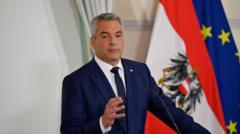The Freedom Party, led by Herbert Kickl, secured nearly 29% of the votes in the September elections, making it the top party. Nevertheless, alliances among other parties have effectively marginalized them from power talks. President Alexander Van der Bellen's decision not to entrust the Freedom Party with the government formation task signals a rejection of their platform, which has been characterized by anti-immigration and pro-Russian sentiments.
In a televised address, Van der Bellen explained that success in the election does not guarantee governance, emphasizing that a party must surpass the 50% support benchmark for that privilege. With the People's Party coming in second at 26.3% and the Social Democrats at 21%, the process of coalition formation is complex and precarious, particularly since only a slim majority would exist should the conservative party ally with Social Democrats.
Nehammer acknowledged the necessity of securing a more stable majority, suggesting a potential partnership with the Greens or the liberal Neos party to solidify government control. He expressed uncertainty about the outcome of ongoing negotiations but reassured citizens of his commitment to governmental stability and reliability.
On the other hand, Kickl criticized President Van der Bellen's decision as a deviation from established practices, asserting that the election results still hold significant value and hinting at a continuation of the political struggle for his party. He insists that the fight for influence is far from over, leaving the prospect of future political maneuvers open-ended. As discussions continue, Austria stands at a crossroads of political integrity and coalition dynamics, with implications resonating beyond its borders.
In a televised address, Van der Bellen explained that success in the election does not guarantee governance, emphasizing that a party must surpass the 50% support benchmark for that privilege. With the People's Party coming in second at 26.3% and the Social Democrats at 21%, the process of coalition formation is complex and precarious, particularly since only a slim majority would exist should the conservative party ally with Social Democrats.
Nehammer acknowledged the necessity of securing a more stable majority, suggesting a potential partnership with the Greens or the liberal Neos party to solidify government control. He expressed uncertainty about the outcome of ongoing negotiations but reassured citizens of his commitment to governmental stability and reliability.
On the other hand, Kickl criticized President Van der Bellen's decision as a deviation from established practices, asserting that the election results still hold significant value and hinting at a continuation of the political struggle for his party. He insists that the fight for influence is far from over, leaving the prospect of future political maneuvers open-ended. As discussions continue, Austria stands at a crossroads of political integrity and coalition dynamics, with implications resonating beyond its borders.

















